Posted on February 28, 2012 by The Orwell Prize -

A girl. Noisy, sweary, political, very ranty. Geek mixed with a touch of law. No-longer-practising barrister. Taken from Twitter profile
Submitted posts
Posted on February 28, 2012 by The Orwell Prize -

From leadership seminars in fancy hotels to medieval figures walking from town to town looking for work in small town factories; from the naïve waitresses working in the mecca of five star hotels to farmers struggling to grow the right crops for the 21st century, Siddhartha Deb’s book is the riveting, moving, darkly comic, brilliantly told story of modern India. With the novelist’s vision, reminiscent of V.S. Naipaul’s An Area of Darkness, combined with the modern narrative force of Maximum City, Deb’s account paints a portrait of this country in turmoil through the story of its people: aspiring and deluded, desperate and hopeful, beautiful and damned. Taken from Penguin Books
Posted on February 28, 2012 by The Orwell Prize -
Posted on February 27, 2012 by The Orwell Prize -

Alex Massie is a freelance journalist, currently based in the Scottish Borders. He spent five years in Washington DC as a correspondent for The Scotsman and the Daily Telegraph. Prior to that he was Assistant Editor and Chief Leader Writer for Scotland on Sunday. He has also worked as a sports journalist and as a magazine feature writer. He blogs about American, British and Scottish politics and culture. And cricket. Taken from Alex Massie on The Spectator Submitted posts Ireland and the Kubler-Ross Model of Grief Muckle Eck’s Big Mo Stray Thoughts on the Execution of Osama bin Laden This Social Union, This Commonwealth A Bill That Shames Scotland Stephen Birrell’s Conviction Shames Scotland Rick Perry: Texas Gaullist Westminster’s Festina Affair Rebekah Brooks: I Am Not A Witch, I’m You Tinker, Tailor, Banker, Spy Other links Alex Massie on Twitter
Posted on March 30, 2011 by The Orwell Prize -
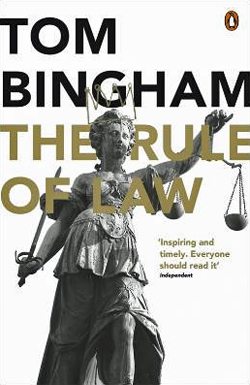
‘The Rule of Law’ is a phrase much used but little examined. The idea of the rule of law as the foundation of modern states and civilisations has recently become even more talismanic than that of democracy, but what does it actually consist of?
In this brilliant short book, Britain’s former senior law lord, and one of the world’s most acute legal minds, examines what the idea actually means. He makes clear that the rule of law is not an arid legal doctrine but is the foundation of a fair and just society, is a guarantee of responsible government, is an important contribution to economic growth and offers the best means yet devised for securing peace and co-operation. He briefly examines the historical origins of the rule, and then advances eight conditions which capture its essence as understood in western democracies today. He also discusses the strains imposed on the rule of law by the threat and experience of international terrorism.
The book will be influential in many different fields and should become a key text for anyone interested in politics, society and the state of our world. Tom Bingham died in September 2010.
Posted on March 30, 2011 by The Orwell Prize -
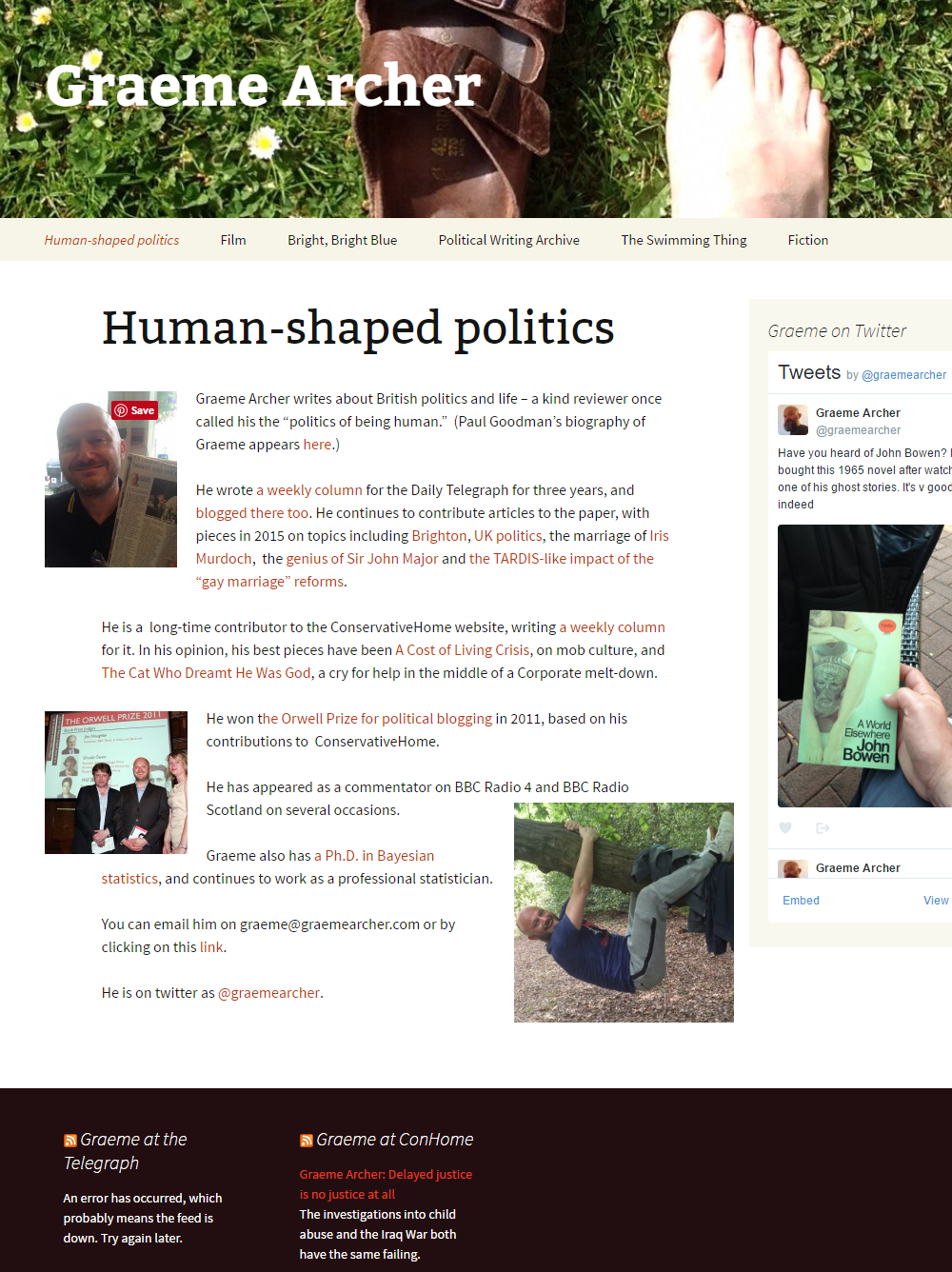
Graeme Archer is a 41 year old, civilly-partnered vegetarian Tory who lives in Hackney & is mildly obsessed with swimming. He writes on the ConservativeHome website, about Tory politics and London life mainly. The biggest influences in his life are the novels of Iris Murdoch. And swimming.
Submitted blogposts
- An Open Primary should select a Coalition candidate for Oldham East and Saddleworth – ConservativeHome, 05/11/10
- As Good As It Gets – ConservativeHome, 23/10/10
- Football Crazy, Football Mad – ConservativeHome, 25/11/10
- Gay People and Christians are not enemies – ConservativeHome, 13/08/10
- What Not To Wear – ConservativeHome, 18/07/10
- Random Power – ConservativeHome, 28/01/10
- Someone else’s sigh – ConservativeHome, 13/04/10
- No Poofs – ConservativeHome, 23/03/10
- Breathe In Peace – ConservativeHome, 17/12/10
- Time for some politics of ‘and’? – ConservativeHome, 09/12/10
Other links
My name is Graeme Archer. I’m a member of the Conservative Party approved list of parliamentary candidates.
Posted on March 30, 2011 by Eric Blair -
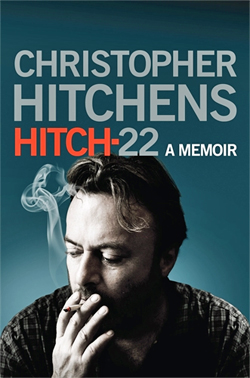
Over the last thirty years, Christopher Hitchens has established himself as one of the world’s most influential public intellectuals. His originality, bravery, range, and wit made him first a leading iconoclast of the political left and then, later in his career, a formidable advocate of secular liberalism. When the Twin Towers were attacked in September 2001, Hitchens was re-energised again, quickly emerging as one of the fiercest and most influential advocates of war on Iraq. In this long-awaited and candid memoir, Hitchens re-traces the footsteps of his life to date, from his childhood in Portsmouth, with his adoring, tragic mother and reserved Naval officer father; to his life in Washington DC, the base from which from he would launch fierce attacks on tyranny of all kinds. Along the way, he recalls the girls, boys and booze; the friendships and the feuds; the grand struggles and lost causes; and the mistakes and misgivings that have characterised his life. Hitch-22 is, by turns, moving and funny, charming and infuriating, enraging and inspiring. It is an indispensable companion to the life and thought of our pre-eminent political writer. Christopher Hitchens died on 15 December 2011.
Posted on March 30, 2011 by The Orwell Prize -

Confined by Lucifer to one of the lower circles of Hell, the Heresiarch nevertheless continues to campaign against all forms of orthodoxy.
Submitted blogposts
Other links
Posted on March 30, 2011 by The Orwell Prize -

Philip Collins is a columnist and leader writer for The Times. He is also the chair of the board of trustees at the independent think tank Demos and a visiting fellow in the public policy unit at the University of Oxford. Before joining The Times he was the Chief Speech Writer for the Prime Minister, Tony Blair, the Director of the Social Market Foundation think tank and an Equity Strategist at two investment banks.
Submitted articles
Other links
Posted on March 30, 2011 by The Orwell Prize -

I’m Paul Mason, Newsnight’s economics editor, a job that takes me from Kenyan shanty towns to Russian hedge funds and Chinese factories. My blog is called Idle Scrawl. It veers wildly across the subject: from house prices, to global poverty; from deconstructing glib terminology to devastating critiques of the England football management. It is occasionally meant to be funny.
Submitted blogposts
Other links
Posted on March 30, 2011 by The Orwell Prize -

Married to Max and mother of two teenage children, Molly Bennett works for a Labour MP and “celebrated” a significant birthday just days after the Party lost the General Election. According to Bridget Jones, Molly is a Smug Married – so why doesn’t she feel smug? Is she suffering from a Mid-Wife crisis, or has working for New Labour just taken its toll? Molly’s story begins in early May…..but where will this year take her?
Submitted blogposts
Other links
Posted on March 30, 2011 by The Orwell Prize -

Submitted articles published by The Guardian, The Observer and Granta. Declan Walsh is The Guardian’s foreign correspondent for Pakistan and Afghanistan.
Submitted articles
Other links
Posted on March 30, 2011 by The Orwell Prize -
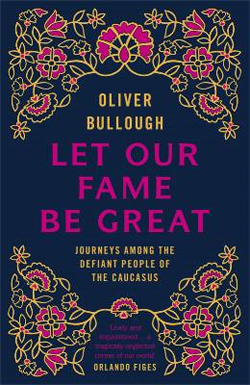
The Caucasus mountains form Russia’s southern border and run from the Crimea to the Caspian Sea. Their jagged white peaks inspired Pushkin and Lermontov, overshadowed decades of guerrilla warfare and were explored by 19th century British mountaineers, but the region is better known to us now (if it is at all) for the struggle in Chechnya and the 2008 summer war between Georgia and Russia over South Ossetia. In Let Our Fame Be Great Oliver Bullough takes the reader through Eastern Europe, Central Asia, Turkey and the Middle East, tracking down the nations dispersed by the brutal wars Russia fought to add these mountains to its empire. Then he journeys through the North Caucasus itself, telling the stories of the land and its peoples. Many of the events he uncovers have never been described in English, while some have never been written about in any language. Let Our Fame Be Great recounts the struggle and survival of peoples who have been mostly forgotten for two hundred years. Their fame is not great, but truly it deserves to be.
Posted on March 30, 2011 by The Orwell Prize -

Rachel Shabi was born in Israel to Iraqi Jews and grew up in England. A journalist, she has written for a variety of national and international newspapers such as The Guardian, the Sunday Times, the New Statesman, the Independent on Sunday, Al-Jazeera English online, the National, Jane’s and Salon.com. For the past five years she has been based in Israel and reporting on the Middle East conflict. Her book, Not the Enemy: Israel’s Jews from Arab Lands, was published by Yale University Press in 2009.
Submitted articles
Other links
Posted on March 30, 2011 by The Orwell Prize -

Leningrad, 1952. Andrei, a young hospital doctor, and Anna, a nursery school teacher, are forging a life together in the postwar, postsiege wreckage. But their happiness is precarious, like that of millions of Russians who must avoid the claws of Stalin’s merciless Ministry of State Security. So when Andrei is asked to treat the seriously ill child of a senior secret police officer, he and Anna are fearful. Trapped in an impossible, maybe unwinnable game, can they avoid the whispers and watchful eyes of those who will say or do anything to save themselves? The Betrayal is a powerful and touching novel of ordinary people in the grip of a terrible and sinister regime, and a moving portrait of a love that will not be extinguished.
Posted on March 30, 2011 by The Orwell Prize -
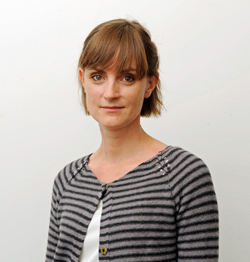
Amelia Gentleman writes on social affairs for The Guardian. She was nominated for the Martha Gellhorn journalism award in 2010, as well as being shortlisted for the Orwell Prize. Previously she was New Delhi correspondent for the International Herald Tribune. She won first prize for feature and comment writing in the 2007 Amnesty International Hong Kong Human Rights Press Awards. She won the Ramnath Goenka prize 2007 for best foreign correspondent covering India. Formerly Paris and Moscow correspondent for The Guardian.
Submitted articles
Other links
Posted on March 30, 2011 by The Orwell Prize -

To follow.
Posted on March 30, 2011 by The Orwell Prize -

For much of the world, Iran’s 2009 summer of upheaval was an epic piece of theatre distantly observed. As citizens took to the streets in their millions to protest a stolen election and the regime that made it possible, and later, in smaller numbers, did battle with the shock troops of the Islamic Republic, so the country became effectively off limits for the world’s media. This dramatic confrontation – and the deep divisions that opened among Iran’s rulers as a result – have yet to be convincingly described for a Western audience. Afsaneh Moqadam observed and took part in the momentous events of that summer. Here, through the eyes of Mohsen, one of Tehran’s young, courageous protesters, Moqadam tells the story of these historic months, from the mass marches that greeted the disputed election results to their brutal suppression by the hated Basij militia – and a dark aftermath of imprisonment, torture and a show trial worthy of Stalinist Russia. The result is an inspiring account of a confrontation that has signalled the fragility of the Islamic Republic and given pause to those Western leaders, notably President Barack Obama, who must grapple diplomatically with what may become the world’s next nuclear power. Above all, Death to the Dictator! is testament to the resilience of the human spirit, and its ability to strike fear in the hearts of despots.

















